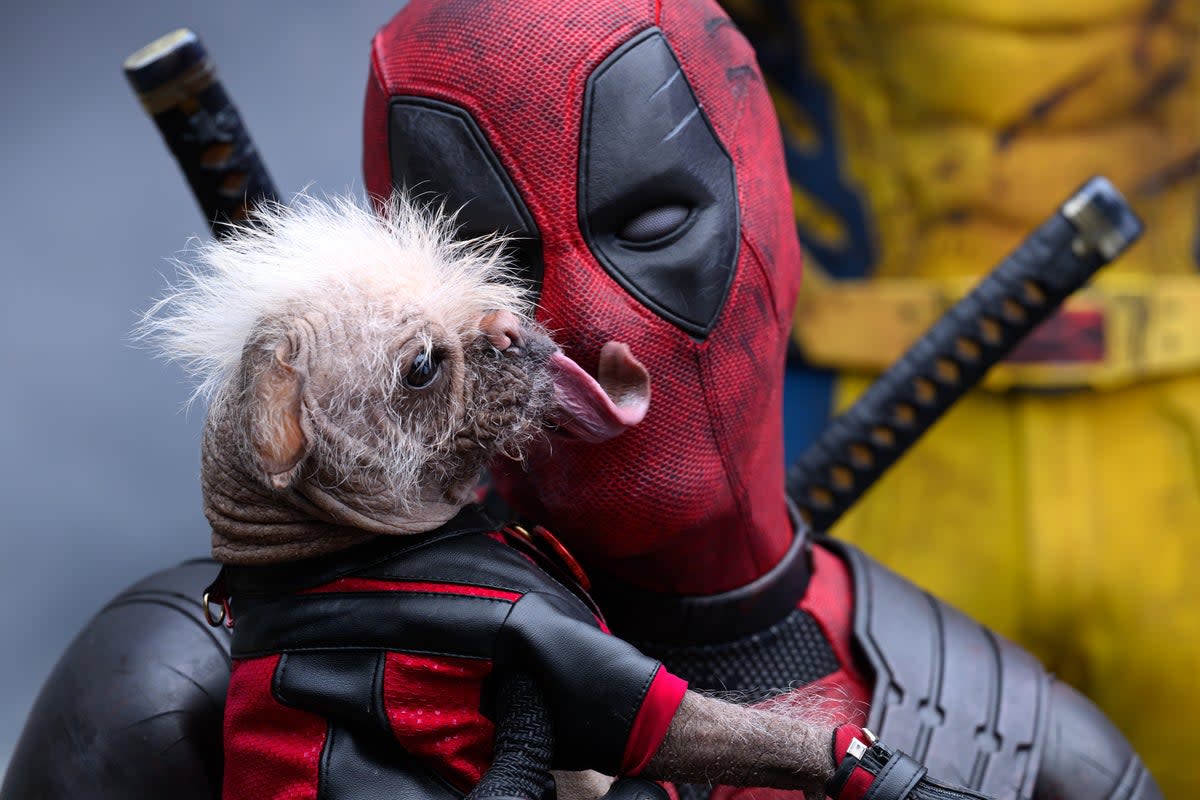Deadpool & Wolverine’s marketing campaign thinks you’re an idiot

Throw out your A-listers, never mind the CGI: in Hollywood, there’s sometimes no more valuable asset than low expectations. At least, this seems to be the thinking behind Deadpool & Wolverine’s marketing campaign, which this week took a swerve into full-bore self-fustigation. “We should set the table correctly,” begins star Ryan Reynolds, in a video “disclaimer” fans could access by following a QR code. “This film is as paper thin as a sequel to Battlefield Earth.”
As marketing similes go, evoking the name of John Travolta’s Scientology-adjacent sci-film is more or less the nuclear option. But Reynolds continues to dunk on his own movie. “We’re mostly going to beat each other senseless, make enemies with Disney, tell a few dick jokes,” he says. “So sit back, relax, let us lower your IQ and raise your heart rate while we travel to a vapid Dreamland, a place where grown men and grown women walk around in tights, and act like it’s not a giant cultural cry for help.” As promos go, this sounds like an – almost – entirely honest assessment from Reynolds, or, more likely, from the bods in Deadpool & Wolverine’s marketing department.
But why is Reynolds selling his big summer blockbuster short? We are not used to hearing words like “vapid” being used to advertise multimillion-dollar movies. It’s exactly the sort of edgy, in-your-face cynicism you might expect from Deadpool, a character who spent the entirety of Deadpool (2016) and Deadpool 2 (2018) spraying snark in the direction of the fourth wall. Here, though, the irony curdles. It’s condescending, disingenuous, and deeply bleak. Deadpool & Wolverine is a corporate brand exercise that’s trying to convince you it’s one of your mates; it’s a supermarket masquerading as a skate park.
There’s a reason I say Reynold’s puckish self-deprecation is only ever almost honest: it is obviously and categorically untrue that the Deadpool & Wolverine team have “made enemies with Disney”. (The film is being made by Marvel Studios, a subsidiary of Disney.) Sure, it might not be considered traditional Disney fare – like the first two Deadpool films, produced for Fox before the Disney merger in 2019, Deadpool & Wolverine will feature gory violence, bad language, and lewd jokes. But framing the film as some kind of anti-corporate work of subversion is ridiculous. It’s a film that’s likely been focused-grouped for maximum profitability, produced in full accordance with Disney’s broader strategy for the franchise. There is no separating the art – or product – from its corporate underpinnings.
Towards the end of the “disclaimer”, Reynolds shifts his scope from the specific frivolities of Deadpool & Wolverine’s specific content to the ills of the superhero genre at large. Once again, he’s not wrong, exactly. You could definitely make the argument that the all-pervasive superhero fad of the past decade and a half does constitute a cry for help – or at the very least, a sign of cultural infantilisation. But for this complaint to emerge from the mouth of Ryan Reynolds, of all people?
The 47-year-old actor and gin tycoon is synonymous with the kind of spandexed slop that he’s supposedly skewering. Deadpool wasn’t even Reynolds’ first attempt at a major superhero franchise, having previously flown around shooting emeralds out his nipples in 2011’s Green Lantern (OK – I’ve not seen it). Before this, there was X-Men Origins: Wolverine (2009), in which he played a very different, entirely quipless version of Deadpool. Go even further back and you’ve got the terrible Wesley Snipes threequel Blade: Trinity. Reynolds might not technically be patient zero for the great, contagious superhero plague, but he was definitely somewhere in the lab when it broke out, running around and licking all the petri dishes.
Even when a Reynolds project isn’t technically in a Marvel film, they still possess that irritating, depthless sheen: films such as 2021’s Free Guy or 2017’s The Hitman’s Bodyguard are superhero schlock in spirit, if not in technicality. It’s galling to hear Reynolds spout off about the vapidity of the modern superhero blockbuster. He’s lobbing rocks through the walls of his own glass house.
Cinema is in a precarious position these days. With a few noteworthy exceptions (Dune: Part Two; Godzilla x Kong: The New Empire), this year has seen many tentpole releases wither at the box office. This is true across all genres – Ryan Gosling/Emily Blunt action-comedy The Fall Guy is the latest big release to disappoint – but the decline is particularly steep when it comes to superhero fare. That Deadpool & Wolverine has to resort to advertorial negging is a tacit admission that all is not well with the genre. Reverse psychology is a last gasp for Marvel, a desperate attempt to shift a product on the wane. What we’re left with is a franchise that has no respect for itself – or, for that matter, for you.
‘Deadpool & Wolverine’ is out in cinemas on 25 July


